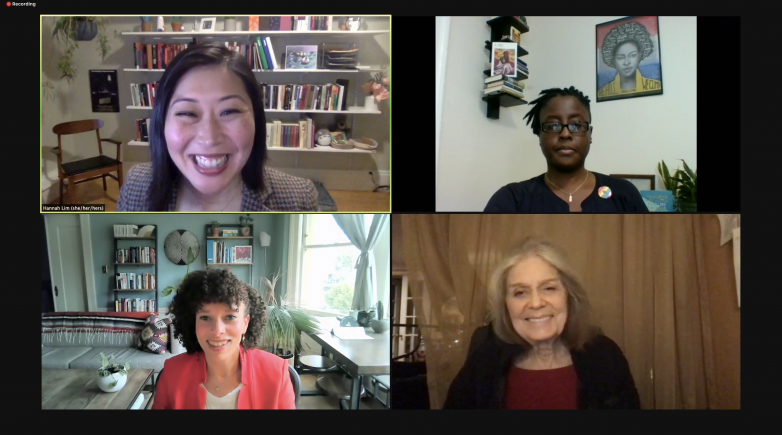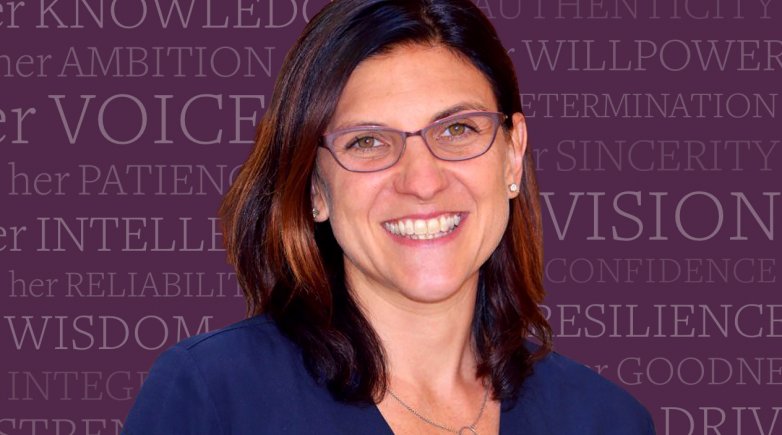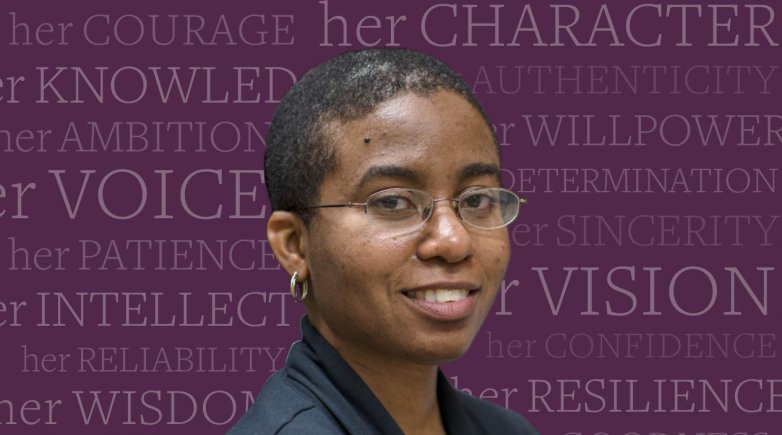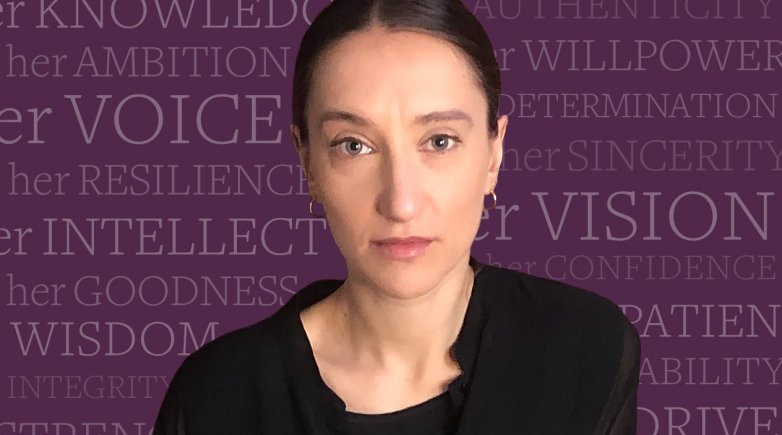For Gloria Steinem, learning means listening
Feminist pioneer shares wisdom with Exeter audience at coeducation symposium.
Gloria Steinem (bottom right) and moderators (clockwise from top left) Hannah Lim, instructor in history, Ciatta Baysah '97 and Meredith Hitchcock '06 during Friday night's conversation on “Traversing Feminism, Race and Sexuality in 2021.”
“I have learned very well over time that I don’t learn while I’m talking,” Gloria Steinem said at the outset of the panel discussion that kicked off a weekend-long virtual symposium on coeducation at Exeter. “I learn while I’m listening.”
The pioneering journalist, feminist organizer and social and political activist joined three moderators — Meredith Hitchcock ’06, Ciatta Baysah ’97 and Hannah Lim, instructor in the History Department — for a conversation on “Traversing Feminism, Race and Sexuality in 2021.” Sarah Odell ’06, one of the symposium’s organizers, introduced Steinem and welcomed the virtual audience, which totaled more than 300 people.
In her opening remarks, Odell mentioned talking circles, which Steinem defined in her 2015 memoir My Life on the Road as “groups in which anyone may speak in turn, everyone must listen, and consensus is more important than time.” This concept became a touchstone over the course of the evening for Steinem, who called the discussion “a historic talking circle” and often seemed just as interested in hearing from the moderators themselves as she was in answering their questions.
The idea — and the importance — of listening came up again and again. “One way to provide a kind of instant democracy is to listen as much as we talk, and talk as much as we listen,” Steinem said, in response to Hitchcock’s question about how to elevate voices with less power than one’s own. She said she keeps a long list of diverse speakers on her wall whom she can recommend instead of, or in addition to, herself.
Both Baysah and Lim pointed out that the feminist movement has often been seen as dominated by white, straight, cisgender, often upper-middle-class women, with Steinem as its most famous face. Steinem acknowledged this perception, but pushed back against it. She recalled her experience in the ‘70s traveling and speaking alongside leading Black feminists like Florynce Kennedy or Dorothy Pitman Hughes. Reporters at press conferences would direct questions about the women’s movement to Steinem, and ask Kennedy and Pitman Hughes only about civil rights.
“Feminism includes all women, or people who identify as women, or it’s not feminism,” Steinem said. The women’s movement, she believed, was in fact “never white, never only heterosexual. It was always about the gendered experience in a world that should not be gendered.”
Building on the questions about inclusivity, Baysah brought up a topic close to the heart of many Exonians. “Some of us take for granted that we enjoy the Harkness table experience,” she said, while others have experienced it as male-dominated and not equally inclusive of all voices, including those of girls and BIPOC students.
Steinem admitted she wasn’t familiar with the Harkness model, but offered some advice on how to build a more inclusive talking circle in the classroom. She suggested the use of a talking stick, used by many Native American groups, and mentions another group whose members placed poker chips in the middle of the table each time they spoke, to make clear who was dominating the discussion or hanging back. The key is to treat listening, which Steinem said is wrongly categorized as a “female” skill, as just as vital a contribution to the group as speaking.
Better listening also provides the key, Steinem said, for educators at residential schools like Exeter when seeking to protect students from sexual violence on their campuses. “The important thing is that we speak about it, whatever it is, and that we not remain silent,” Steinem said. “The specifics are known by the people who experience it, and they should be listened to.”
Steinem believes putting more value on listening, and other stereotypically “feminine” behaviors like caretaking or showing emotions, doesn’t just benefit women. “I’m sure men would have fewer problems with blood pressure and tension and so on if it was more socially OK for them to cry,” she added.
Though the COVID-19 pandemic has seen women suffer a disproportionate amount of job losses and other burdens due to the closure of schools and other childcare facilities, Steinem said it could also be taken as an opportunity to reevaluate the traditional divisions of household labor along gender lines. “I notice that men who have been at home now because of this pandemic are often more aware of what it takes to raise children, what it takes to cook dinner, what it takes to clean the house, than they were before,” she said.
At various points in the evening, Steinem reflected with humor that her 60-year-long career of activism allows her to take a more optimistic view than some younger feminists. “One of the good things about being old is that you remember when it was worse, and one of the great things about being young is you’re mad as hell ‘cause it’s not better,” she said. “That’s why we need each other.”
Near the end of the discussion, Hitchcock relayed a question from Robin Sortor Lofquist ’75, who said she worried that younger women had forgotten — or even rejected — some of the advances made by feminists in the 1970s and ‘80s. Steinem’s response, and her advice for Lofquist, seemed equally relevant for past, present and future generations of women.
“Trust your own experience, and don’t lower your standards,” she said. “You have a right to be heard, you have the pleasure of listening. Try for 50/50. Try for instant democracy, and then it could become more permanent.”



